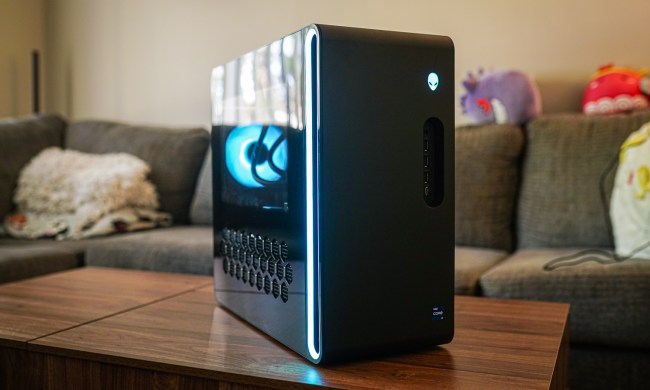Apophenia is a general term for interpreting patterns from data. This is why we tend to see dragons or bunny rabbits in clouds or see faces in trees. This has helped humanity over the years, as it allowed us to predict where predators are or where we can find some tasty mushrooms out in the wilderness.
An issue arises when we try and force a pattern or a conclusion to be perceived as logical. Most of the time, this can actually hinder us from seeing what is actually there. This is a common occurrence when analyzing media. People seem to almost grasp desperately at straws of logic to construct a secure foundation in their analysis. A blue curtain doesn’t have to mean the protagonist is sad, and an off-kilter story set in the Pacific Northwest doesn’t inherently earn comparisons to director David Lynch’s Twin Peaks, the cult TV series that serves as a frequent point of comparison for some of gaming’s stranger titles.
When we compare a game like Alan Wake (which just received a remastered edition) to the works of Lynch, we are doing a disservice to both the game and the filmmaker himself.

Lynchian media
The term “Lynchian,” used to describe media that bears a resemblance to Lynch’s work, has become the recent casualty of something I call “saturation of definition.” Much like the equally overused “Kafkaesque,” Lynchian has been twisted and stretched out to define themes and media that can only be described as tangentially related.
When we say something is Lynchian, what are we really saying? Well, Lynchian is defined as media with surrealist visuals and themes that mix the mundane and absurd into a dreamlike reality. Strangely enough, this definition is technically quite broad and can encapsulate Alan Wake into it. The obvious comparison with Alan Wake is Lynch’s iconic show, Twin Peaks. Both of them deal with a strange town in the Pacific Northwest with a supernatural mystery that blurs the lines of reality. However, this is where the comparison should stop between the two. Going any further only makes grouping them more absurd, and not in a One-eye Jack way.
Alan Wake’s story is a mystery grounded in reality. The titular character can be perceived as an everyday man fulfilling the fish-out-of-water trope that the story requires. As the mystery unfolds, we meet citizens of Bright Falls trying to live their lives and outlive the supernatural tragedy surrounding them.
Twin Peaks’ story is a mystery grounded in its own reality. Special Agent Dale Cooper, the supposed fish out of water, is still completely in his element as he understands the mystery more than other characters. Even his obsession with coffee and occasionally hanging upside down for his morning ritual pulls him away from being a character grounded in our own reality. The citizens of Twin Peaks are not grounded in a world that we personally know. It’s filled with high schoolers dancing alone in empty hallways, lumber tycoons that fake their deaths, and characters like a superpowered, eye-patched woman who is convinced she is still a 16-year old teenager.

A work of art devalued
It is quite frankly not fair to even compare Alan Wake to David Lynch’s work. Forcing it to fit into the parameters devalues what Alan Wake brings as a work of art. The game is definitely a pastiche of supernatural thrillers, which can be easily seen even in the first hour of the game. It takes inspiration from a slew of literary works, like those of Stephen King and even H.P. Lovecraft. Yes, you can even see where the game got its influence from Lynch’s work. The hitchhiker with an ax, the unspeakable darkness surrounding the town, and a whole slew of horror tropes litter this game. They are here to serve the central theme of the game: The power that the author has in shaping a narrative.
Without spoiling too much, Alan Wake deals with the control — and lack of control an author — has over their work. The game’s narrative constantly reminds you about what and who is influencing Alan on his journey and what he can even do about it. We see this more with all of the references to other supernatural media in the game. Focusing on one part of that diminishes what the game is trying to tell the player.
David Lynch is a master at storytelling, especially with mysteries. He is more concerned with giving the audience enough clues to try and encourage them to solve the mystery themselves than showing the audience the answers to everything. A mystery is no longer fun when you know what it all means. Many storytellers today are petrified about leaving any unanswered questions by the end of it all. Stories now feel inclined to wrap up neatly or to have enough left unnswered to work in a sequel. Lynch is not interested in that — he would rather bombard you with new clues and information that will contradict what you originally thought.
Yes, Alan Wake’s ending does leave things open to interpretation, but it still gives you a structure that you can follow and make a conclusion. Most of Lynch’s work has its own internal structure, a rhythm or melody that all of his characters know and is unconcerned if the audience can understand it.
Mundane meets absurd
An important aspect of so-called Lynchian stories or world-building is the blend of the mundane and the absurd. Allowing the audience to sit with and experience a slice of life with absurd aspects creates a strong sense of the uncanny, the feeling that something is off even if you can’t put your finger on it. Anyone who has watched the original two seasons of Twin Peaks will tell you that most of the show is mundane absurdity. All of the characters and their relationships feed into the uncanny feeling of the town. Almost like an optical illusion, the titular town looks solid and believable in one perspective, but completely alien when looked at from a different angle.

Alan Wake does not allow us much time to sit with the mundane. The stories found through collectibles in the game give us a glimpse of that everyday life in Bright Falls, but this can easily be ignored or even avoided. Even the “uncanniness” of the Dark Presence escalates in a natural narrative way, building on top of itself to create a linear path to the end.
We want to call Alan Wake Lynchian because it is an easy way to tag it in our brains and file it under weird mysteries. On the surface, it makes sense to us, but looking deeper only shows how shallow this is. Alan Wake is a psychological thriller that blends themes from many literature inspirationse. It is grounded in our reality to tell the story of a man forced into tragedy and finding a way to overcome it. We need to approach games and media like Alan Wake by actually looking at what they are trying to tell us, the player and viewer, instead of seeing pine trees and moving to the most convenient comparison.
Alan Wake Remastered is out now on PC, PlayStation 4, PS5, Xbox One, and Xbox Series X/S.



